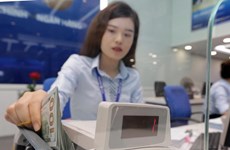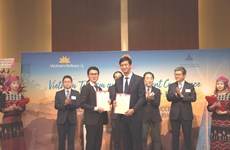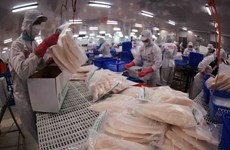Opportunities and challenges for farm exports
Experts at a recent seminar hosted by the Ministry of Agriculture and
Rural Development shared the view that Vietnam’s World Trade
Organisation (WTO) membership has both positively and adversely affected
the country’s agricultural sector, radio The Voice of Vietnam reports.
Experts at a recent seminar hosted by the Ministry of Agriculture and
Rural Development shared the view that Vietnam’s World Trade
Organisation (WTO) membership has both positively and adversely affected
the country’s agricultural sector, radio The Voice of Vietnam reports.
Deputy Minister Nguyen Thi Thu said Vietnam is especially vulnerable to global market fluctuations because it is unable to capitalise on the advantages offered by the WTO.
Dr Pham Lan Huong from the Central Institute for Economic Management (CIEM) said climate change and external factors also had negative impact on Vietnam ’s agriculture.
In the 2007–2012 period, the forestry-agriculture-aquaculture sector grew at an annual rate of 3.4 percent, lower than the rate of 4.1 percent in the five years before Vietnam joined the WTO.
The shift of the national economic focus to industry and services was also considered a factor behind the decline.
Huong argued that recent dramatic increase in petroleum prices has greatly benefited Vietnam ’s macroeconomy in terms of crude oil export, but the agricultural sector has suffered losses from using a large volume of petroleum in production and processing.
In the past five years, fertiliser prices rose by 2.5 times, but rice prices increased by only 1.2 times. As a result, agricultural production costs went up by 35–40 percent with no matching gain in revenue.
Expert Pham Thi Ngoc Linh from the Institute of Policy and Strategy for Agriculture and Rural Development (IPSARD) noted that the tariffs imposed on imported agricultural products had been reduced to between zero and 10 percent on staples like beef, dairy products, and rice.
Most of the country's agricultural exports to FTA partners faced tax rates of between 5–15 percent, with sugar, dairy products, vegetables, and meat subjected to those as a high as 30 percent, she said, adding that Vietnam's trade deficit with its ASEAN, Chinese, South Korean, and Japanese FTA partners would reach 4 billion USD by 2017.
Linh said Japan and the RoK are the most potential markets for Vietnam ’s rice, dairy, and other agricultural products under the terms of FTAs.
IPSARD head Dang Kim Son reiterated that Vietnam’s WTO membership has revealed the weaknesses of domestic agricultural products, and the agricultural sector is also hampered by its small production scales, obsolete technology, and limited connectivity with other economic sectors.
He also said FTA tax reductions have presented foreign companies with plenty of third-country export opportunity.-VNA
Deputy Minister Nguyen Thi Thu said Vietnam is especially vulnerable to global market fluctuations because it is unable to capitalise on the advantages offered by the WTO.
Dr Pham Lan Huong from the Central Institute for Economic Management (CIEM) said climate change and external factors also had negative impact on Vietnam ’s agriculture.
In the 2007–2012 period, the forestry-agriculture-aquaculture sector grew at an annual rate of 3.4 percent, lower than the rate of 4.1 percent in the five years before Vietnam joined the WTO.
The shift of the national economic focus to industry and services was also considered a factor behind the decline.
Huong argued that recent dramatic increase in petroleum prices has greatly benefited Vietnam ’s macroeconomy in terms of crude oil export, but the agricultural sector has suffered losses from using a large volume of petroleum in production and processing.
In the past five years, fertiliser prices rose by 2.5 times, but rice prices increased by only 1.2 times. As a result, agricultural production costs went up by 35–40 percent with no matching gain in revenue.
Expert Pham Thi Ngoc Linh from the Institute of Policy and Strategy for Agriculture and Rural Development (IPSARD) noted that the tariffs imposed on imported agricultural products had been reduced to between zero and 10 percent on staples like beef, dairy products, and rice.
Most of the country's agricultural exports to FTA partners faced tax rates of between 5–15 percent, with sugar, dairy products, vegetables, and meat subjected to those as a high as 30 percent, she said, adding that Vietnam's trade deficit with its ASEAN, Chinese, South Korean, and Japanese FTA partners would reach 4 billion USD by 2017.
Linh said Japan and the RoK are the most potential markets for Vietnam ’s rice, dairy, and other agricultural products under the terms of FTAs.
IPSARD head Dang Kim Son reiterated that Vietnam’s WTO membership has revealed the weaknesses of domestic agricultural products, and the agricultural sector is also hampered by its small production scales, obsolete technology, and limited connectivity with other economic sectors.
He also said FTA tax reductions have presented foreign companies with plenty of third-country export opportunity.-VNA













